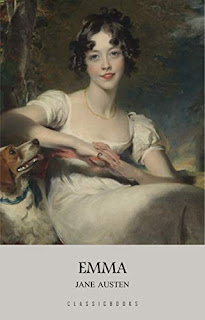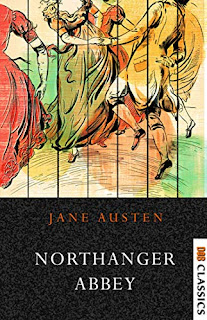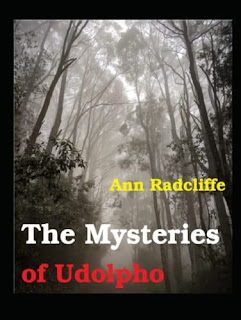Emma
Published: 23, December 1815
Author: Jane Austen
Genres: Classic, Comedy & Humor, Drama, European, Family Life, Fiction, Friendship, Historical, Literature, Regency, Romance, Rural Fiction, Small Town, Teen, Victorian, Young Adult
Check the summary of this book here:
The Review:
Emma by Jane Austen is a character study of a person who, because of her social standing, has a complex or nearly perverted sense of ethics when it comes to the value of socioeconomic status. This anecdote is significant because it demonstrates how upper-class individuals establish their own subculture based on money or, in Emma's case, familial ties. These shifts in the socio-climate might result in some very nasty-spirited persons, such as Emma's negative attributes, even if they are unaware that they are being cruel or terrible to others.
As I mentioned in the previous paragraph, this is like a character study and this sort of character lays the backdrop for some fascinating insights into human nature, particularly in terms of the many forms of influence that individuals have over others. Emma loves rearranging people like chess pieces. She enjoys the cause and effect of social events involving people and has an abnormal desire to influence the fate of others.
This was Jane Austen's last novel published while she was still alive, but it is not her final novel; before she began writing it, she had already stated that she would create a character that people would probably dislike, but Emma has been liked and continues to be liked, as we see her develop in this story.
Emma comes to see the light and makes positive adjustments throughout the story. I'm not giving anything away by mentioning this because it's obvious from the start. Reading what is happening to her is the most beautiful part of this novel.
This appeared advanced to me in terms of psychological/satirical components, such as the father's intellect level being obliquely poked fun at on a regular basis. Austen's resentment of her father is darkly humorous, with references to the weather or the temperature of the room indicating Emma and her father's cultured or academic contrasts.
I've just skimmed Austin's work for anagrams, but I believe the father figure represents the usual male authority of the period. I believe she is making an early woman's power statement disguised behind the character of her father and Emma's intellectual division as an author communicating via her fiction.
It was also entertaining to compare the films offered. A question always comes up while reading this and other books like this, what would your reaction be if you married someone 16 years your senior? Austen's period had various challenges that we would not be able to deal with as well. The book provides a fascinating look at Austen as a proponent of early women's liberation. We don't appreciate how fortunate we are. These days, we can do whatever we want.
I believe some readers' disdain for Emma is misconstrued because, as always, she was intended to be the way she was, and the author created her in such a manner that the reader dislikes her at first, but gradually begins to change the sentiments towards her with her own, and eventually begins to enjoy her by the end.
And this takes me to my most reviled topic: we must not despise a novel or a writer just because of a character we dislike or because the character is defective; we must recognize that some tales require flawed characters to advance.
A book and plot will never progress without these characters. Sometimes there is no villain in a novel, and we just despise the main character until we realize that this figure was misunderstood by us and was both the hero and the villain of his or her own life and story, much as we do to ourselves in real life.
Final Thoughts:
Because of the period, it was written, I didn't get the impression that it was outdated. I felt as if I were reading a complex character study with clever psychological components.
One of the reasons I wanted to read all of Jane Austen's writings was that the very macho author of Master and Commander Patrick O'Brian would frequently dedicate his books to Jane Austen. Patrick O'Brian's few available interviews also mention Austin as one of his key literary inspirations, which is enough to make you want to read an author you've never read or who solely writes about a subject you're not interested in.
Synopsis:
“Oft-copied but never bettered, Jane Austen's Emma is a remarkable comedy of manners.
Part of the Macmillan Collector’s Library; a series of stunning, clothbound, pocket sized classics with gold foiled edges and ribbon markers. These beautiful books make perfect gifts or a treat for any book lover. This edition is illustrated by the celebrated Hugh Thomson and includes an afterword by David Pinching.
Austen follows the charming but insensitive Emma Woodhouse as she sets out on an ill-fated career of match-making in the little town of Highbury. Taking the pretty but dreary Harriet Smith as her subject, Emma creates misunderstandings and chaos as she tries to find Harriet a suitor, until she begins to realize it isn't the lives of others she must try to transform.”
Useful Search Related Words & Keywords:
Alan Cumming, Ann Radcliffe, Ann Ward, Anya Taylor-Joy, Austen Books, Austen Criticized It In Northanger, Autumn De Wilde, Carey Mulligan, Catherine Morland, Classics Edition, Douglas McGrath, Drama, Emma Woodhouse, Even Though, Felicity Jones, Frank Churchill, General Tilney, Giles Foster, Gothic Romance, Gothic, Great Story, Gwyneth Paltrow, Handsome Clever, Harriet Smith, Henry Tilney, Jane Austen, Jane Fairfax, JJ Feild, John Thorpe, Johnny Flynn, Jon Jones, Josh O'Connor, Katharine Schlesinger, Kindle Edition, Literature, Mansfield Park, Miss Bates, Miss Taylor, Mrs Allen, Mrs Elton, Mysteries Of Udolpho, Northanger Abbey, Oxford World, Peter Firth, Pride And Prejudice, Robert Hardy, Romance, Sense And Sensibility, Toni Collette, World Classics, Worth Reading, Young Lady, Young Man
Rating: 90/100
Recommended: 95/100 Yes.
Buy the Kindle version here:
Free with free Audible trial:
The Complete Works of Jane Austen:
Emma. (2020) (13+):
Emma (1996) (PG):
- - - - - - - - - - - - - - - - - - - - - - - - - - - - - - - - - -
Any kind of support, even a simple 'like, thumbs up or a small comment' is enough and helps me grow, create and freely do more stuff and work on projects for the benefit of many.
Buy Me a Coffee: https://www.buymeacoffee.com/Namsu
Help me grow into a global force: https://www.patreon.com/namsu
Support with crypto coins/tokens: https://cointr.ee/namsu
- - - - - - - - - - - - - - - - - - - - - - - - - - - - - - - - - -










